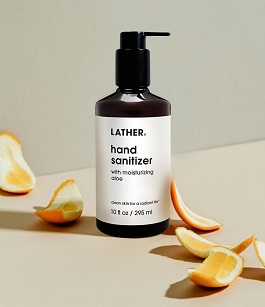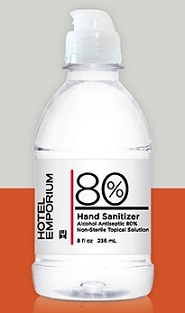
NATIONAL REPORT—While the Centers for Disease Control and Prevention (CDC) is most concerned about the spread of COVID-19 through the air, it can also be spread by touching a recently affected surface and then one’s mouth, nose or eyes. Because of this, hand sanitizer has become a necessity in hotels—in guestrooms, entrances, and lobby areas, and elsewhere where guests and employees travel on property. While initially a challenge to find, hand sanitizer has become readily available to the lodging industry. Even brewers and distillers are making it. Not all hand sanitizers are the same—the percentage of alcohol content can vary, natural scents or liquids can be added, and, as one company has proven (Minibar Systems Worldwide), alcohol need not even be an ingredient.
Industry suppliers, some of whom you would expect to sell sanitizer and some of whom you would not, are selling product in different size containers, along with automatic dispensers and stands, and as part of kits that include combinations of other items such as a face mask, antiseptic wipe, soap, lotion, etc.
To get the maximum benefit from alcohol-based hand sanitizers, the CDC recommends that people use a product that contains at least 60 percent alcohol, cover all surfaces of their hands with the product, and rub them together until dry. The CDC says that alcohol-based hand sanitizers can quickly reduce the number of microbes on hands in some situations, but sanitizers do not eliminate all types of germs. Hand sanitizers may not be as effective when hands are visibly dirty or greasy.
A Chemical Kill
Alcohol’s job is to break up the outer coatings of germs and viruses. It is a chemical-kill-based way of killing. Those who use alcohol-based sanitizer frequently can experience overly dry skin and cracking. Many hand sanitizers, however, contain a moisturizer to counteract this impact.
The following is a list of links to some of the companies currently selling alcohol-based hand sanitizer and/or dispensers for it: A-1 Textiles & Hospitality Products, American Hotel Register, Gilchrist & Soames, Green Suites Hotel Solutions, Guest Care Solutions, HD Supply, Hotel Emporium, Kure, LATHER, Pineapple Hospitality, and T2 Site Amenities.

Those companies selling alcohol-based sanitizer should pay attention to child safety. The CDC says from 2011 to 2015, long before the current widespread use of hand sanitizer, U.S. poison control centers received nearly 85,000 calls about hand sanitizer exposures among children. “Children may be particularly likely to swallow hand sanitizers that are scented, brightly colored, or attractively packaged,” the CDC says. “Hand sanitizers should be stored out of the reach of young children and should be used with adult supervision.”
Mechanical-Kill Method
Late last month, Minibar Systems Worldwide introduced microSURE persistent sanitizers that use unique mechanical-kill spikes that act as a barrier to provide better protection against germs and viruses beyond hand washing and chemical-kill alcohol based products. The active ingredient in microSURE is Benzalkonium chloride. According to the company, the 8-Hour Defense hand sanitizer has proven up to 8 hours of defense against germs when used properly, and will not crack, dry, or burn skin.
Also launched was Minibar Systems Worldwide’s SmartHands touchless, automatic sanitizer dispenser designed with infrared sensors which dispenses the microSURE 8-Hour Defense hand sanitizer. The large 1000ml capacity disposable bag will provide up to 1,250 uses. Either 0.8 ml or 1.2 ml can be produced. The dispenser is ideal for use in hotel lobbies, meeting rooms, elevator landings, health clubs, restaurants and all public spaces.
Walt Strasser, Executive Vice President, Minibar Systems Worldwide, says response to microSURE has been “overwhelming” so far.

“microSURE has been around for 14 years and used in hospital settings but now has been reformulated for hand sanitizer,” Strasser says.
A disadvantage with alcohol-based sanitizers is that once the sanitizer dries on the hand, the hand can be easily recontaminated once another contaminated surface is touched.
“microSURE puts killing spikes on hands and surfaces that other products don’t have,” Strasser says. The protection only comes off when the skin naturally exfoliates.
Strasser says his company’s sanitizer is the safest for humans. “It is very organic,” he says. microSURE was tested by researchers at The University of Liverpool, where after months of experimentation, experts concluded that the nanotechnology utilized by microSURE was “chemically inert and harmless to humans.”
Glenn Hasek can be reached at greenlodgingnews@gmail.com.





